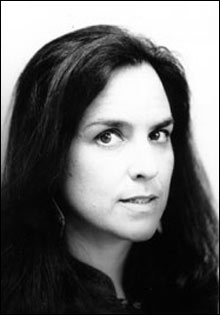
Elizabeth Benedict
|
Call me a literary perv. But for my money, there’s nothing in a novel more satisfying or exhilarating than a scene of sexual betrayal. You've invested hours in the life of this character. You were there when he found his lover. There for the courting, there when the two decided to move in together. Now 350 pages into the book, your guy finds himself in a nightclub bathroom grabbing at the flesh of a beautiful stranger in a boozy haze while his main squeeze collects drinks by the bar. (Hot, huh? That's from Claire Messud’s The
Emperor's Children, in case you’re interested.)
Embarrassingly enough, my weakness for these sort of scenes led me to check out “The Joy of Learning To Write Sex Scenes” at Porter Square Books last Thursday night. The host, local author and Grub Street instructor Elizabeth Benedict, penned the classic resource, The Joy of Writing Sex: A Guide for Fiction Writers.
I must confess that the very idea of an event devoted to crafting better fuck scenes both scared and thrilled me. I had visions of taking part in an excruciating ice breaker ("OK everybody, state your name and your favorite sexual position"), and then maybe writing a sex scene or two to be read aloud to a neighbor (mine of course, would be middle-aged, talkative, and a dead ringer for my mother). In the event that we were asked to do the latter, I readied a fictional elderly couple named Leon and Mona and gave them a back-story that went like this:
As a lover Leon was second to a really great shampooing, but Mona knew better than to respond to his feeble attempts at thrusts as anything other than seismic. After all, Leon took great pride in his new hips.
When I arrived to find nine or so rows of neatly assembled chairs facing a podium a few steps from the children's section, I realized how wrong I’d been about all this. Those who were on hand for the event — a surprisingly diverse group of elderly folks, middle-aged men and women, and a sprinkling of twenty-somethings — were mainly there to observe. This was to be Benedict's show.
In the kind of smart black suit a motivational speaker might wear to a corporate seminar, Benedict divided her time between a podium and a jumbo-sized pad. On the latter, she scribbled down the issues we wished for her to address, topics such as "How explicit to be," "How much to say," "What to call it," "How to be original."
We were told to think about some memorable sex scenes in fiction. Somebody suggested Ulysses, another Anna Karenina. Benedict added to our list Lolita, a book she said was thought to be “the dirtiest book ever written.” “Yet you could barely find the sex scenes.” Benedict also brought referenced Flaubert’s description in Madame Bovary of the carriage rocking, intended to suggest that inside the deed was being done. Her point? The most effective scenes don’t have to be particularly descriptive or revealing.
On the subject of "what to call it," Benedict advised that we take our cues from our characters. Portnoy’s Complaint is filled with crass language not because Philip Roth enjoys making readers cringe, but because words like “cunt” and “cock” suit his character. Or in some cases, as in the passage Benedict read from British novelist David Lodge's Paradise News — about a forty year old virgin experimenting sexually with a divorced mental health worker — one need not call it anything at all:
“Today is still touching only, but nowhere is off-limits, we can touch where we like, how we like, OK? …Would you like to suck my breasts? Go ahead. Is that nice? Good, it's nice for me. Can I suck you? Don't worry, I'll squeeze it hard like this and that'll stop you coming. OK. Relax. Was that nice? Good.”
“Does anybody ever worry about what their husband or wife will think?” our host asked at one point. Head nods all around. "Ex-husband,” one woman called out. Benedict brought up the writer Russell Banks, whose mother skips over the dirty passages when reading his work. We’re told to give our loved ones the right to do that. Later Benedict remarked sternly that when writing “you have to silence those voices.” More head nods.
No doubt, much of this advice was reasonable. But the way it was handed over to us didn’t seem like an especially productive approach. Discussing sex sure was easy when we had somebody else to do all the talking. The real challenge, of course, would come later when we got home and had to figure it out for ourselves.